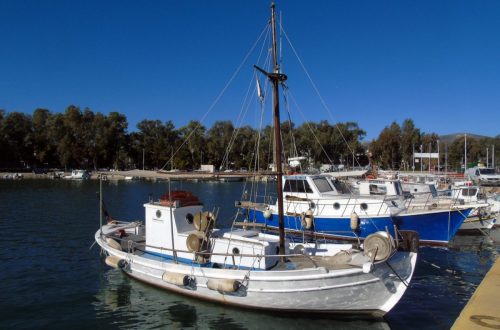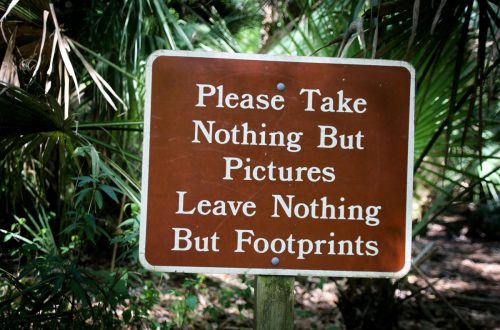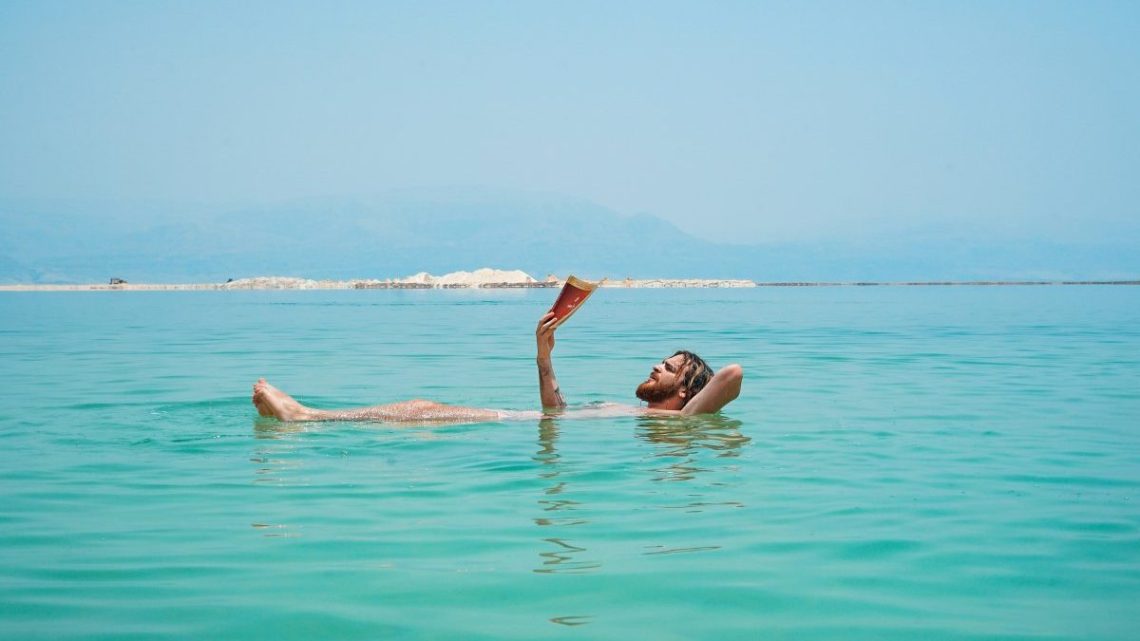
Why I Wouldn’t Visit the Dead Sea in Jordan Again
You’ve likely heard many stories about the unique experience of floating in the Dead Sea, located between the borders of Jordan and Israel. Maybe you’ve seen countless pictures of people covering their bodies in its famous therapeutic mud or imagined yourself relaxing in the warm sun on its shores.
But what if I told you that this experience is not as idyllic as it seems? At least mine wasn’t. Before packing your bags, you should read this guide on why I would never visit the Dead Sea in Jordan again.
If you are wondering how to plan a trip to Jordan and you’re struggling to find all the information you need, head to my complete guide for the country. You won’t regret it!
A Little Bit of History
Located between Jordan to the east and Israel to the west, the Dead Sea is a salt lake whose banks are more than 429 meters below sea level, making it Earth’s lowest elevation on land. The Dead Sea has a rich history that dates back to biblical times. It is mentioned in the Bible as a place of refuge for King David and was one of the world’s first health resorts for Herod the Great.
The high salt concentration that allows people to float effortlessly on the surface is a phenomenon that has been documented since ancient times. In fact, the Greek philosopher Aristotle wrote about the remarkable waters of the Dead Sea in his writings.
Throughout history, the Dead Sea has been valued for its therapeutic qualities. The Egyptians used the asphalt from the Dead Sea in their mummification processes, and Cleopatra was said to have built cosmetic and pharmaceutical factories along its shores.
During the Roman era, the Dead Sea was a place of relaxation and retreat. King Herod built one of the world’s first health resorts on its shores, and later, the Roman aristocracy followed suit. The Dead Sea’s mineral-rich mud and high salt content were used for therapeutic and cosmetic treatments.
In the modern era, the Dead Sea continues to be a popular destination for health and wellness tourism. Its mineral-rich mud and unique salt composition are used in a variety of skincare and health products. The Dead Sea region is also home to several world-class resorts and spas that capitalize on the sea’s therapeutic properties.
Is The Dead Sea in Jordan Safe to Visit?
Rest assured, your safety is typically not a concern when you visit the Dead Sea in Jordan. This unique destination, one of the world’s saltiest bodies of water, has been a magnet for travelers for centuries.
One of the first things that has to come to your mind when planning a trip is insurance.
Safetywing’s Nomad Insurance is one of the best options available out there. With a maximum coverage of 365 days, they are a great option whether you are a Nomad or not! They offer very low rates, but excellent coverage and immediate support (in a few minutes!). The best part? Nomad Insurance can be purchased even if you have left your home country already.
Lastly, they also cover extreme sports, something that can come in very handy if you are an adventurous soul.
There are ongoing safety measures like regular patrolling and checkpoints when you get in and out of the area. This doesn’t mean that there is danger around, but rather that the Jordanian government is taking every measure available to ensure everyone feels safe.
However, it’s always important to note the environment. Remember that the excessive salt concentration in the water can cause discomfort if it comes into contact with open wounds or your eyes. It’s recommended that you wash with clean water after swimming, to remove the salt from your skin as fast as possible.
What is the best time of year to visit the Dead Sea in Jordan?
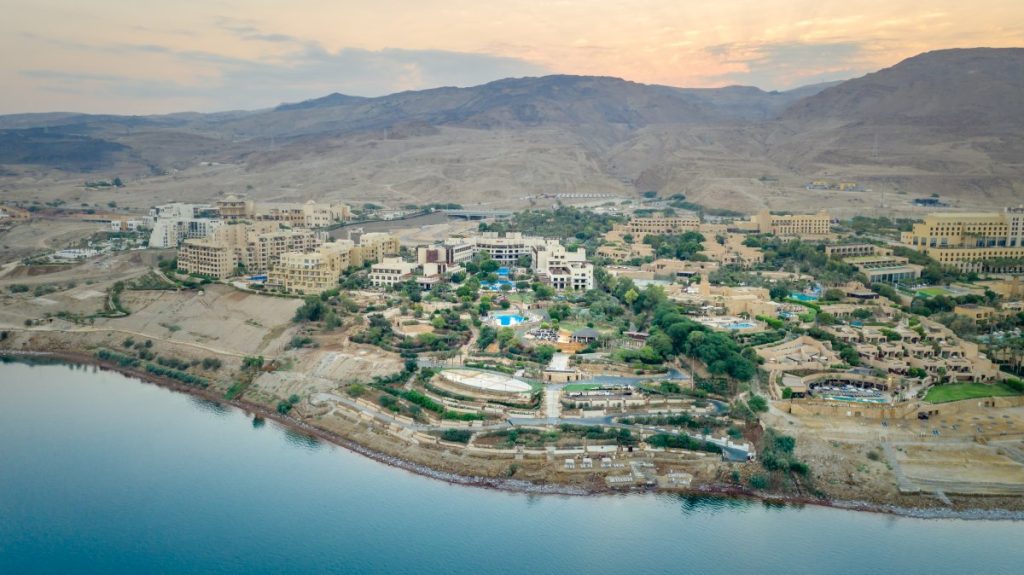
If you’re asking yourself when the optimal time for visiting the Dead Sea in Jordan is, it largely depends on what you’re looking for in your trip. Each season offers a unique perspective of the Dead Sea, always depending on the types of travelers and their preferences.
Spring, which generally lasts from March to May, could be your ideal choice. During this season, temperatures are mostly moderate, hovering between 16°C (60°F) and 27°C (80°F), allowing for a more comfortable stay.
Summer, spanning from June to August, can get extremely hot, with temperatures often exceeding 40°C (104°F). If you enjoy heat and sunbathing, this is your season. Keep in mind though, summer can be busy (and very expensive), so book your accommodations in advance to avoid disappointment. Due to the extreme temperatures, don’t forget to stay hydrated and protect your skin with sunblock while enjoying the healing properties of the sea.
Autumn, lasting from September to November, could be another wonderful option. Similar to spring, temperatures during autumn are mild, perfect for those who prefer cooler weather. Visitor traffic is generally reduced (and prices lower) after the summer rush, providing a quieter, relaxed, and more budget-friendly experience.
Winter, which falls between December and February, might be the least favorable season due to colder temperatures and occasional rainfall. Despite this, the Dead Sea maintains a steady warm temperature, making it suitable for a relaxing dip. Plus, you’ll find the best deals on accommodations during this period, great for budget-conscious travelers.
How to Get to the Dead Sea in Jordan
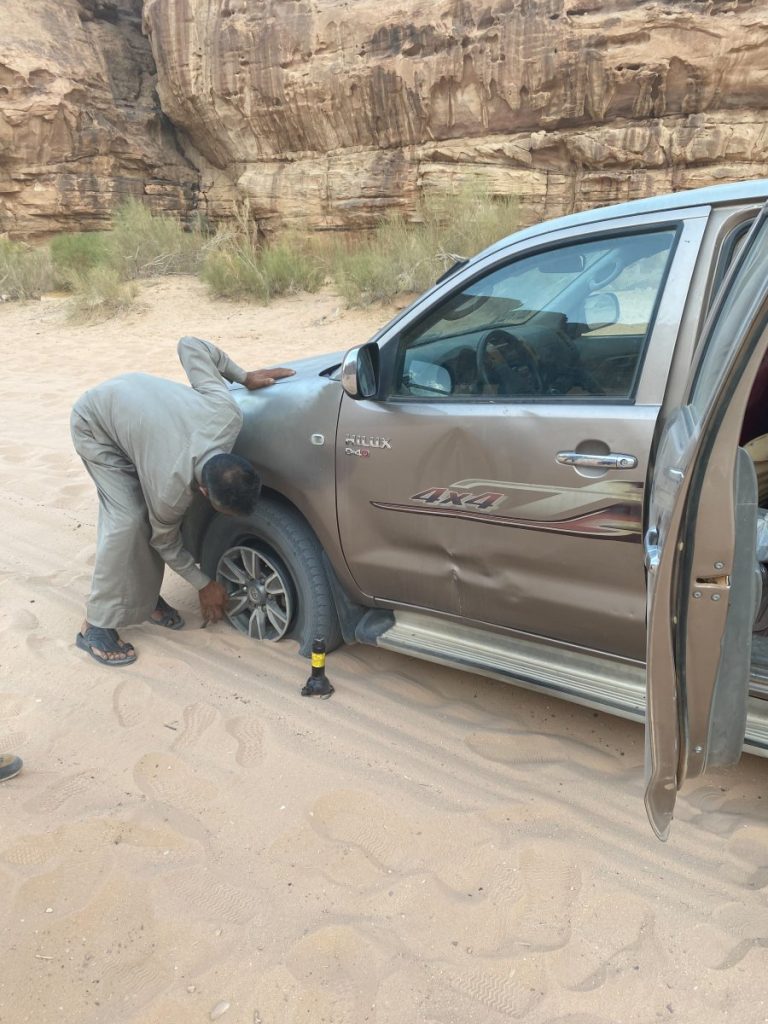
The most common way to reach the Dead Sea is by flying into Queen Alia International Airport in Amman, the capital city of Jordan. This airport is serviced by many international airlines, making it accessible from various parts of the world. Once you land in Amman, you have several options to reach the Dead Sea.
1. Renting a Car
Generally, the easiest way to move around in Jordan (And, thus, getting to the Dead Sea) is by renting a car. Many international car rental companies have branches in Jordan, making it quite easy to arrange this.
However, I would suggest Monte Carlo car rentals (A local Jordanian Rental agency) with an open heart, as my experience with them was terrific. They offer the lowest fares we could find in the country, and they even gave us more perks than what we’d asked.
The drive to the Dead Sea area will take you approximately an hour. The route is quite straightforward – you need to head towards the city of Madaba, then follow the signs to the Dead Sea. Driving in Jordan is on the right-hand side, and the roads are generally in good condition.
2. By Bus
For those on a budget, the public bus system in Jordan is a cost-friendly option. Buses run regularly from Amman, the capital city, to the Dead Sea. From Amman, you can take a bus from Mujaharin bus station to Rame. This way is a lot more affordable than renting a car. Then, you’ll have to take a taxi to your hotel or beach of choice. Don’t forget to bring your best bargaining skills with you, as there are no fixed taxi fees.
3. By Taxi
If convenience is your top priority and you’re less concerned about cost, then a private taxi (or ride-sharing services like Uber or Careem) might be the perfect choice. The cost can vary depending on the time of day and traffic, and could reach upwards to $100. However, it’s a good option if you like comfort and prefer not to drive in a foreign country.
4. By Hotel Shuttle
Lastly, many hotels and tour operators offer shuttle services to the Dead Sea. This can be a convenient option as it often includes pick-up and drop-off at your hotel. It’s worth checking with your accommodation or tour operator to see if this service is available.
Why you Might Want to Visit the Dead Sea in Jordan
Before I dive into my personal experience and why I think that the Dead Sea is not worth to be a main part in your Jordan itinerary, I will dedicate a few paragraphs on why this place might sound compelling to you, and highlight some of the things you can do there.
What are the benefits of visiting the Dead Sea in Jordan?
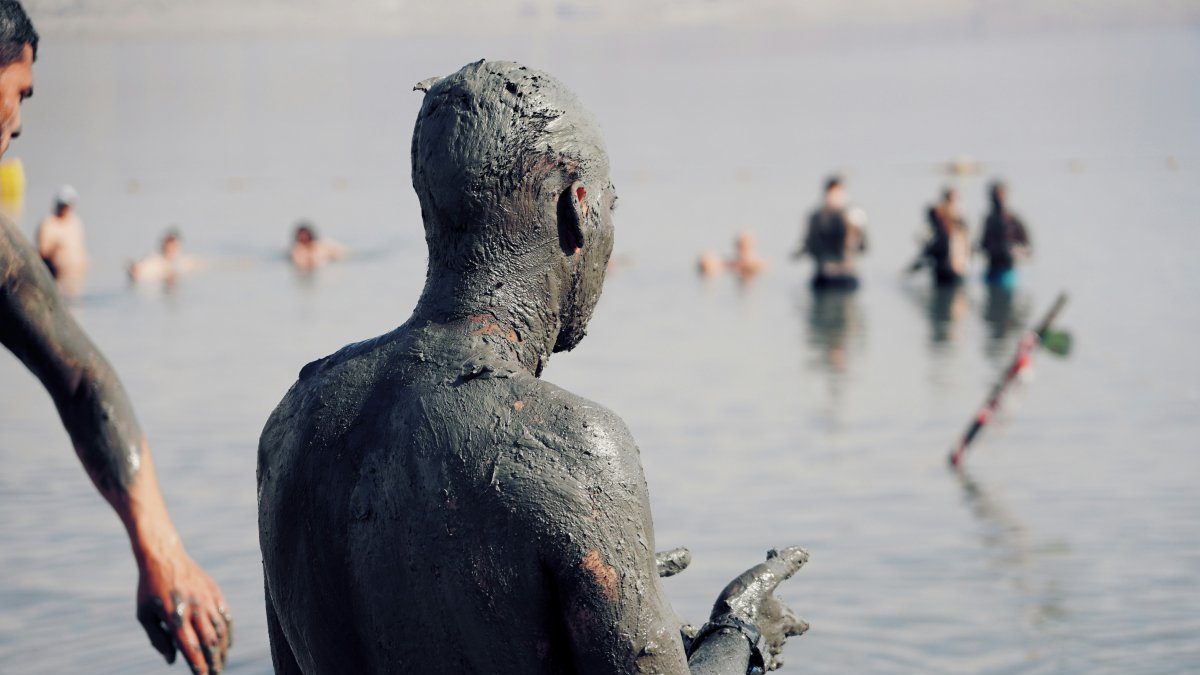
Beyond its undeniable beauty, you’ll gain plenty of health benefits when you visit the Dead Sea in Jordan.
The minerals in the Dead Sea mud and salt, including magnesium, calcium, and potassium, are known for their therapeutic qualities. This could mean a possible impact on skin conditions, relief from rheumatic discomfort, and even a boost in the overall mental well-being after a visit.
Furthermore, (And I was really surprised to find out) due to the low altitude and the unique atmospheric conditions here, the Dead Sea region has fewer harmful UV rays. You can enjoy more sunshine without the worry of a harmful burn. Plus, the barometric pressure is higher, meaning those with respiratory issues might often find it easier to breathe.
What activities can you do at the Dead Sea in Jordan?
1. Float in the Saline Waters
The Dead Sea undeniably creates an environment (almost) impossible to find anywhere else on Earth. Because of the high saline content, you’ll find that you can float effortlessly on the water’s surface. You’ll sure have seen pictures of people floating in the waters holding a newspaper, or a magazine and having fun. This is a genuine thing you can do there.
2. Mud Baths
As I wrote above, the mud of the Dead Sea is rich in minerals like magnesium, calcium, potassium, and iron, which are known for their health and beauty benefits.
The process of taking a mud bath at the Dead Sea is quite simple. Just cover yourself in the thick, black mud found along the shoreline. After letting it dry under the sun, wash it away in the sea. This ritual leaves the skin feeling soft and rejuvenated.
Beyond the skin benefits, mud baths are also believed to have therapeutic effects. The high mineral content is said to help with conditions like psoriasis, eczema, and arthritis. Many visitors report feeling a significant reduction in their symptoms after a mud bath.
3. Enjoy Luxurius Hotel Vacation
Once you reach the site, you’ll find an entire coastline covered with hotels. The region is home to some of the world’s most luxurious hotels and resorts, undeniably offering world-class services and amenities, such as private beaches, spa treatments, and fine dining experiences. If you are someone who enjoys this kind of vacation, this is a place for you.
4. Visit the Dead Sea Panoramic Complex and Museum
The Dead Sea Panoramic Complex and Museum is a unique venue that offers a deep insight into the Dead Sea’s geological, historical, and environmental significance.
The complex is located on top of a cliff, providing breathtaking panoramic views of the Dead Sea, the Jordan River Valley, the Judean Desert, and the mountains of Moab. The view alone is worth the visit.
The museum within the complex houses a variety of exhibits that dive into the geological formation of the Dead Sea, its unique ecosystem, and the history of the region. The exhibits are both educational and engaging, making it a great destination for families.
There, you can also learn about the therapeutic benefits of the Dead Sea’s mineral-rich mud and water. The museum provides information on the various health and wellness benefits that have attracted people to the Dead Sea for centuries.
Besides the museum, the complex also features a restaurant that serves Jordanian cuisine. Here, you can enjoy a meal while taking in the spectacular views of the Dead Sea.
5. Try the Oldest Fast Food in Jordan
Chilli House is the oldest fast-food chain in Jordan. The owner lived in the US for many years, where he learned everything from the most successful fast-food chains. When he returned to Jordan, he founded ”Chilli House”. They offer everything, from spaghetti to sandwiches and burgers, all including their secret chili sauce.
This place was actually very affordable, and the food was well-prepared and delicious. While my experience in the world-famous Dead Sea was not ideal, I really enjoyed this one, and I would surely recommend it to everyone who decides to visit the Dead Sea in Jordan.
Why I Would Never Visit the Dead Sea in Jordan Again
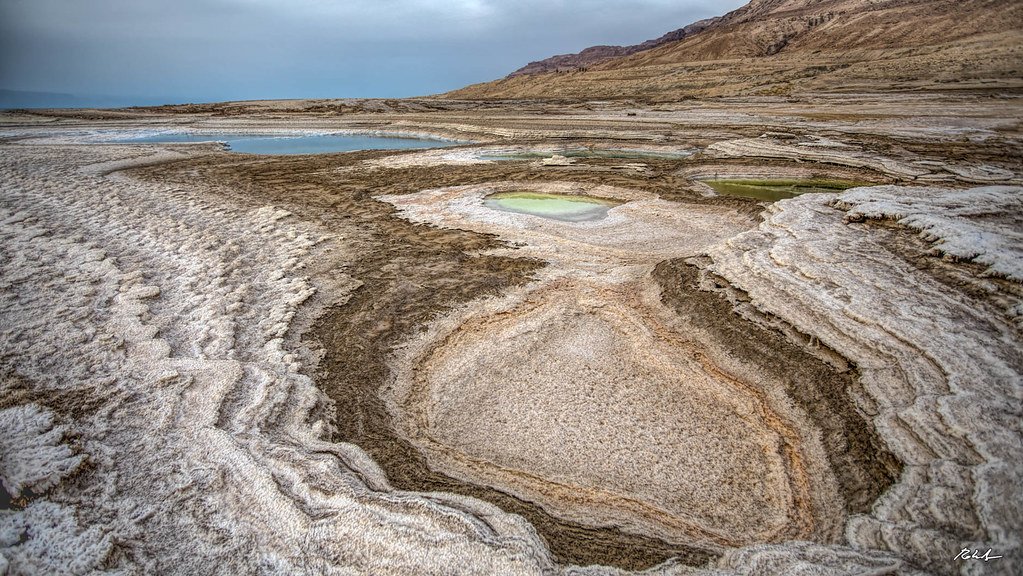
Roberto Saltori, Flickr
As obvious as it might already seem, I did not enjoy my time in the Dead sea. Below you’ll find a few reasons why, and I believe that these are important things to get into consideration before you book your stay there.
1. Because of the Way it Really Works – My Experience
When arriving at the Dead Sea coastline, you have two main options.
One, pay a significant sum of money to one of the luxury hotel chains in the area, so they can let you swim on their private beaches. They will offer you access to the showers afterwards and will give you a few credits to use at their very expensive restaurants.
Option two, swim on one of the only few public beaches, but with two major drawbacks. First, camels swim in the same waters, so they may not be the cleanest. Secondly, locals have set their (not so legal) ”bars” in the place. They will demand a generous tip to protect your car, let you get in, and have access to the (presumably public) showers.
Frustrated with the situation and not wanting to spend much money for a 20-minute swim (more time in those waters is considered dangerous), we left the site disappointed.
2. Because it Lacks Diversity
Let’s continue by debunking the scenic appeal of the Dead Sea. Yes, the unique floating abilities and therapeutic benefits of the saline waters are possible highlights. But apart from this, there’s a limited richness in terms of natural diversity.
The landscape primarily consists of water and desert surroundings. There are no coral reefs to snorkel, no marine life to observe, and no routes for hiking. So, if you are someone who prefers diversity in your experiences, the Dead Sea might not be your top pick.
3. Because it can Hide Dangers
Furthermore, in recent years, the decline in water levels has unveiled sinkholes along the coast, making certain parts inaccessible and even potentially dangerous. The changing landscape, partly due to human intervention and climate change, has undoubtedly affected the visual appeal of the area. In essence, the Dead Sea’s charm as a scenic paradise is slowly changing.
Secondly, the salinity level of the water, which is ten times that of other seas, can cause discomfort. While floating is an unusual and fun experience, any small cut or scrape can sting intensely when exposed to the salty water. Furthermore, caution must be exerted to avoid splashing water into your eyes or swallowing it which could lead to severe pain and discomfort.
4. Because it is Very Expensive
Shall I touch on the cost? Visiting the Dead Sea doesn’t come cheap. Considering the hefty entrance fees to resorts, the additional charges for treatments, and the typically much (much, much) higher food and drink prices in the vicinity, a dip in the salty waters could turn out to be a very costly experience. Add in the expenses of a potentially long drive or cab ride from Amman or Petra, and the overall cost might give you a headache.
5. Because it lacks Middle Eastern authenticity
There is a reason why Middle East is my favorite region on Earth. Getting lost into the traditional markets or souks, meeting the kindest and most loving people, trying amazing local food; That’s what Middle East is all about.
No doubt there’s magic in dipping into the waters of the Dead Sea, but it has been heavily commercialized to deliver to the influx of tourists. This has led to a complete dilution of the authentic Middle Eastern experience.
The presence of international hotel chains, spas, and resorts can make it feel more like a Westernized tourist destination than a unique Middle Eastern one. These large corporations often overshadow local businesses, which has led to a lack of authentic cultural experiences.
Instead of immersing yourself in the local culture and supporting local economy, you might end up in a standardized environment that lacks the unique vibe of Jordan. While this may not be as important to every tourist, it really bothered me.
Final Thoughts
Now that we’ve explored the reasons you might not want to visit the Dead Sea in Jordan, it’s only fair to say that these points do not make it evil or unworthy of your attention. Not everyone is the same type of traveler. If you are someone who enjoys luxurious and expensive vacation, this place is surely for you.
The world is a diverse place, made so by its wide spectrum of experiences. It’s intriguing to try out the healing mud and float freely on the water, nearly impossible to sink. But these unique experiences may not manage to outweigh the costs, a lack of diversity, and everything else highlighted earlier. For me, they didn’t.
The crucial part is to make a well-informed decision. Hopefully, this deep dive into the pros and cons has equipped you with the necessary insights. In the end, travel is about exploring, encountering, and experiencing the extraordinary appeal of different places.


